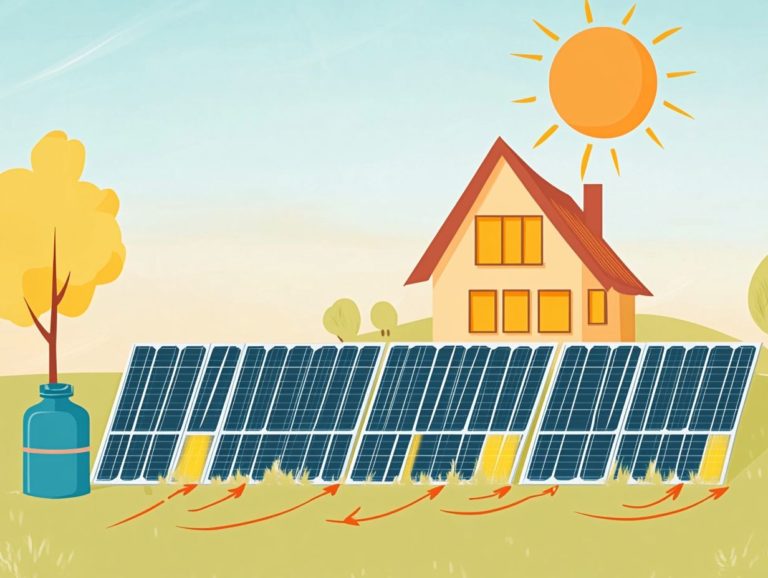“Exploring the Benefits of Solar Energy Incentives”
As the world increasingly embraces sustainable energy, solar energy emerges as a top contender for homeowners and businesses alike.
This article delves into the fundamentals of solar energy, explaining how solar panels operate and the different systems available for your needs.
You ll discover a range of incentives offered by both government and private sectors, thoughtfully designed to make transitioning to solar more accessible and affordable.
We ll address common misconceptions and guide you through the eligibility and application processes, ensuring you can fully benefit from the financial savings and positive environmental impact of solar energy.
Discover the amazing benefits of solar energy today, and start your journey toward a brighter, more sustainable future!
Contents
Key Takeaways:

- Solar energy incentives save you money.
- Government and private programs are available.
- Understand eligibility and application for success.
The Basics of Solar Energy
Understanding the fundamentals of solar energy is essential for homeowners eager to embrace sustainable practices that tackle climate change and help reduce greenhouse gas emissions.
Solar energy, harnessed from the sun, offers a renewable solution that can markedly decrease your energy bills while enhancing the value of your property.
With fossil fuels becoming less viable and solar panel installation costs declining, many homeowners are making the shift to solar power, enjoying both environmental rewards and financial advantages.
Understanding Solar Panels and Systems
Solar panels are advanced devices that capture sunlight and convert it into usable energy. They play a vital role in solar energy systems designed to optimize energy production and efficiency.
These systems typically include different parts, like inverters, which are devices that change the DC electricity generated by the panels into AC energy, making it suitable for your home.
To enhance their functionality, consider integrating battery storage systems, which allow you to store excess energy for cloudy days or nighttime hours.
By utilizing solar panels, you reduce your energy bills and contribute to a sustainable future by decreasing reliance on fossil fuels.
Federal tax credits and local incentives can help cut installation costs, making it more appealing to invest in renewable energy solutions and boost your energy efficiency.
Types of Solar Energy Incentives
Navigating the landscape of solar energy incentives can profoundly influence your financial decisions regarding solar installation.
Access various programs, such as the Investment Tax Credit and cash rebates, which can reduce your upfront costs. This makes switching to solar energy not just an environmentally conscious choice but a financially savvy one as well.
Government and Private Incentives

Government and private incentives motivate you to adopt solar energy, with utility companies offering programs that effectively reduce installation costs for homeowners.
These initiatives often provide financial assistance through rebates, significantly lowering those upfront expenses and making it easier for you to switch to renewable energy sources.
Utility companies also offer renewable energy certificates, allowing you to earn financial credits for every megawatt-hour of solar energy your system produces. This boosts the financial appeal of installing solar panels and cultivates a vibrant market for renewable energy.
By promoting collaboration among local governments, businesses, and non-profits, these incentives ensure that solar energy is a feasible and attractive solution for many households, including yours.
Benefits of Solar Energy Incentives
The benefits of solar energy incentives create a significant environmental impact. They reduce reliance on fossil fuels and promote sustainable practices that actively combat climate change.
Embracing these incentives enhances your bottom line and contributes to a cleaner, greener planet for future generations.
Financial Savings and Environmental Impact
Investing in solar energy systems offers remarkable financial savings through lower energy bills. You also help reduce your carbon footprint and support the fight against climate change.
By leveraging sunlight, you can significantly cut your monthly energy costs often by as much as 50% or more, depending on the size of your system and local energy rates.
You might even earn revenue by selling excess energy back to the grid. This transforms your solar investment into a source of income, providing immediate financial relief and promoting long-term savings as energy prices climb.
Using renewable energy sources results in fewer greenhouse gas emissions. This fosters a healthier environment and ensures a sustainable future for generations to come.
How to Take Advantage of Solar Energy Incentives
Act now to make the most of solar energy incentives by navigating the eligibility and application process.
This approach ensures you capitalize on available cash incentives and programs designed to offset solar installation costs.
Eligibility and Application Process

Understanding the eligibility criteria for solar energy incentives is crucial for homeowners looking to navigate the application process. This knowledge helps you secure valuable financial incentives to significantly reduce installation costs.
These criteria often include specific income thresholds that determine your qualification for various rebate programs. These programs aim to make solar installations more accessible.
Different property types whether single-family homes, multifamily units, or commercial buildings come with tailored requirements you should be aware of.
Regarding solar panel specifications, certain models may need to meet minimum efficiency ratings or be certified by recognized agencies to qualify for incentives.
To streamline your application, gather relevant documentation, such as proof of income and detailed property information.
Following the submission guidelines meticulously ensures that all your forms are filled out correctly and submitted on time.
Common Misconceptions About Solar Energy Incentives
Debunking common misconceptions about solar energy incentives is vital for homeowners who feel hesitant about this important financial decision.
It s easy to get swayed by myths and misinformation surrounding solar power. Understanding the truth enables you to make informed choices.
Addressing Myths and Misinformation
Addressing myths about solar power is essential for grasping the true potential and benefits of financial incentives available for solar installation.
You might believe that solar technology is prohibitively expensive and reserved for the wealthy elite. This misconception can prevent you from discovering how affordable solar energy systems have become, thanks to advancements in technology and enticing federal and state tax credits.
You may also think that solar panels need abundant sunlight to work effectively. However, modern systems harness energy even on cloudy days.
By educating yourself on these misconceptions and exploring viable financing options, you can make informed decisions that lower your utility bills and contribute to a more sustainable future.
Frequently Asked Questions
What are solar energy incentives?

Solar energy incentives include rebates, tax credits, grants, or loans offered by governments or utility companies to encourage the adoption of solar energy systems. These incentives help you save money.
What are the benefits of solar energy incentives?
Solar energy incentives can reduce the cost of installing a solar system. This makes it more affordable for individuals and businesses.
They also shorten the payback period. This increases the return on investment for solar projects.
Who is eligible for solar energy incentives?
Eligibility varies by program and location. Generally, homeowners, businesses, and non-profit organizations can qualify if they install solar systems.
What types of solar energy incentives are available?
Incentives include federal tax credits, state and local rebates, and utility company programs. There are also incentives that pay you based on your system’s energy production.
How do I apply for solar energy incentives?
The application process differs by program. Some require an application before installation, while others need proof of installation afterward.
Be sure to research the specific requirements for each program.
What is the timeline for receiving solar energy incentives?
The timeline for receiving incentives can differ. Some programs provide incentives upfront, while others require you to file for tax credits during tax season.
Consult a solar energy professional to understand the timelines for specific programs.






